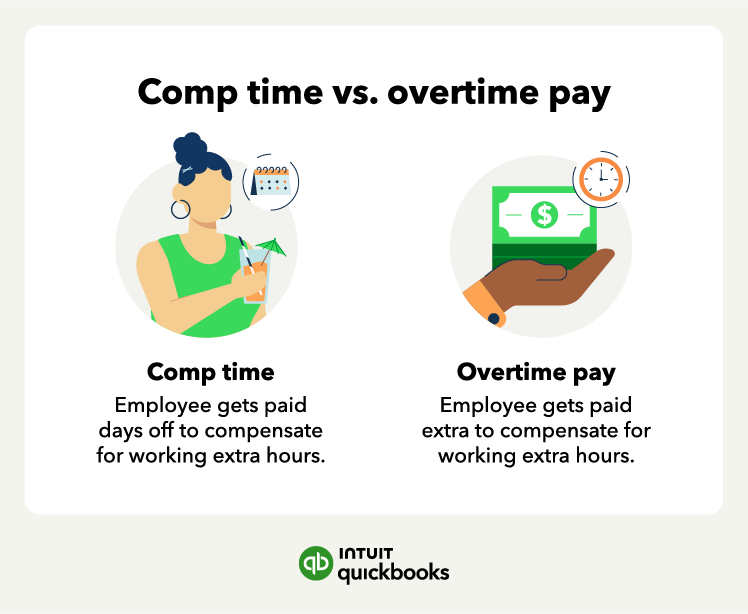Comp time meaning
Comp time, short for compensatory time, is when employers compensate their employees for overtime hours with time off, instead of overtime pay

Comp time, short for compensatory time, is when employers compensate their employees for overtime hours with time off, instead of overtime pay
As a small business owner, you may wonder if you can offer your employees comp time instead of overtime pay.
While comp time is a widespread practice, it is usually illegal for private-sector businesses (including private-sector nonprofit agencies) to compensate overtime-eligible employees with comp time instead of overtime.
So, is comp time legal? Comp time is usually illegal in the private sector, and it is more common in the public sector. However, some exempt employees may be eligible for compensatory time in the private sector.
According to the FLSA rules, nonexempt employees are entitled to overtime pay, and exempt employees are not. Usually, employees are exempt if you pay them a regular salary, which means they don’t qualify for overtime pay.
But how does comp time work? Comp time policies and regulations will depend on your type of business, location, and whether your employees are exempt or nonexempt.
According to the FLSA rules, under a few circumstances, state and government agencies may legally use comp time. But you have to meet the following conditions:
There are a few states that have laws allowing employees at nongovernmental jobs to use comp time instead of overtime. For example, Washington state allows comp time if the employee specifically agrees to it.
But keep in mind: The Department of Labor (DOL) will generally enforce stricter federal or state labor laws. Consult an employment law specialist and reach out to your state’s government agency to confirm your business’s policies about comp time and overtime.
Employers in the private sector can legally offer comp time to exempt employees, under FLSA section 207(o), but it's not a requirement. Under the FLSA, exempt employees are not eligible for overtime pay, so any comp time offered for hours worked in excess of 40 per week falls to the employer.
If you offer comp time to exempt employees, it’s important to create a policy outlining how and when you'll offer comp time so the benefit is applied consistently.
Rules about compensatory time are enforced by the DOL and penalties can be extremely steep violations:
Under the FLSA, it’s also illegal to ship goods that a business produced while violating minimum wage laws, overtime laws, or compensatory time regulations.

Even though overtime pay and comp time are methods for compensating employees for working extra hours, the main difference between them is how you compensate employees.
Compensatory time is when you provide employees with a paid day off to compensate them for working extra hours. For example, when an employee works 56 hours during one week, the employer might tell them to take two days off the following week as compensation.
Overtime pay is when you give employees a higher hourly rate for the extra hours worked, generally one and a half times the hourly rate. For example, the employee who worked 56 hours in a week at $20 per hour would be entitled to $30 per hour for the additional 16 hours they worked.
Some employees may offer nonexempt employees a choice between comp time and overtime, anticipating that some employees may prefer time off to overtime pay.
Unfortunately, the law is clear when it comes to the majority of private-sector employers. Even if nonexempt employees prefer comp time to overtime, the FLSA still mandates that they be paid overtime instead of granted comp time, even if the overtime is unauthorized.
Even in cases where comp time is legally permitted, there are some real challenges in implementation. For example, if an employee receives compensatory time and they have to take it in the same pay period, they might find it difficult to choose a day to take off. In some cases, they might not even use the comp day because they are so busy doing their job.
Another challenge of implementing a comp time policy is employee morale. While it’s important to consider the legal aspects of comp time, business owners and managers should also consider the impact on morale. Employees might not feel appreciated that their work is valued when employers would rather avoid overtime pay.
These challenges and limitations could impact employee retention, engagement, and motivation—things that otherwise would not happen if employers offered overtime pay. At the heart of FLSA laws about comp time and overtime is the core purpose of the FLSA: to ensure fair pay for hours worked.
Rewarding employees for their work and time spent on tasks is crucial to maintaining employee morale and building a strong company culture. For some businesses, offering comp time can help employees unplug and enjoy some time off. Remember to create a comp time policy and ensure you follow the proper laws and regulations.
The best way to ensure employees have the correct schedule and receive compensation for overtime hours is through a time tracking tool that integrates with payroll and accounting software.